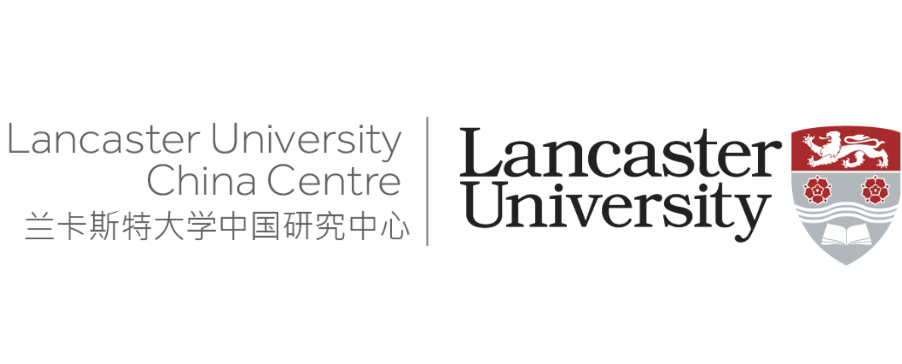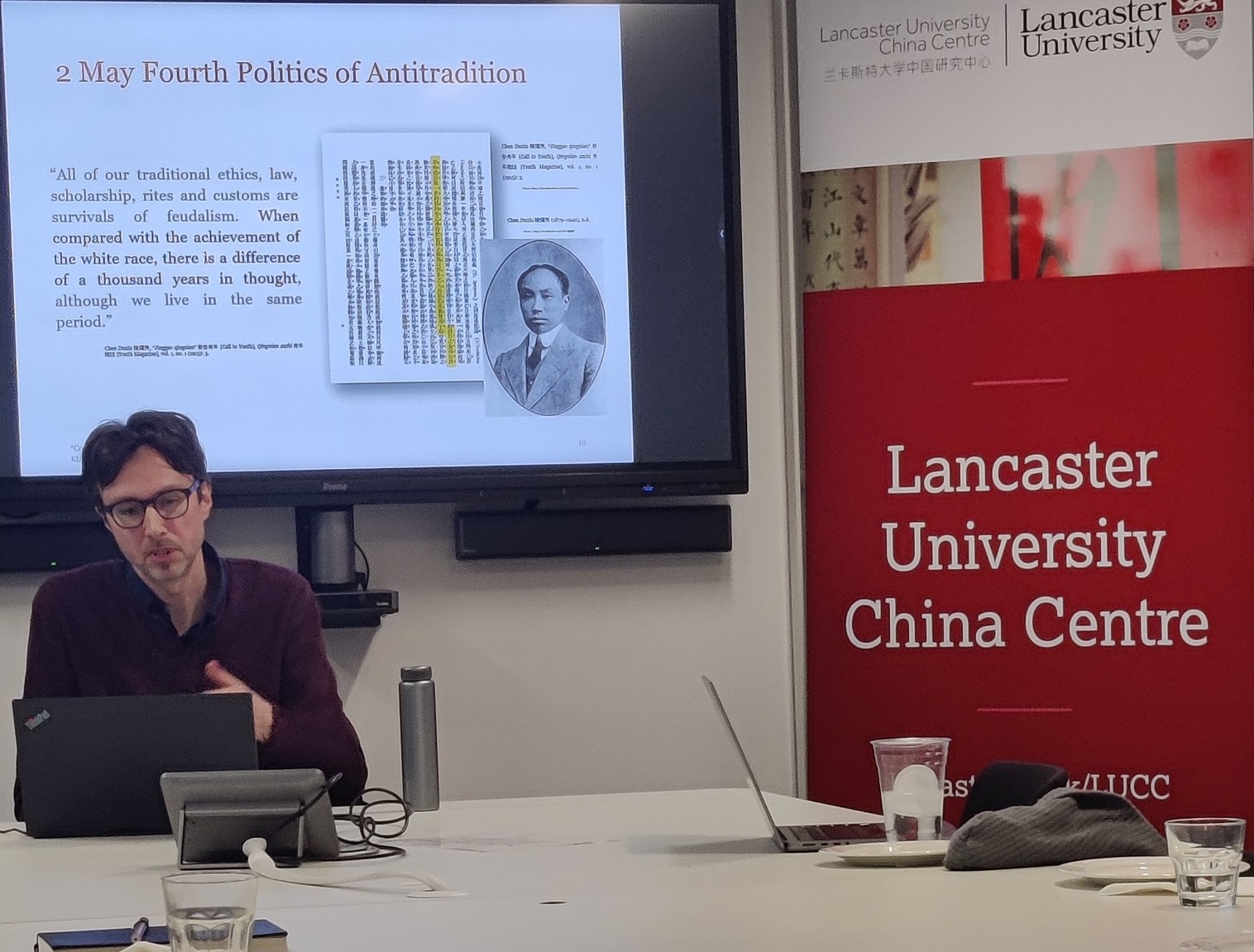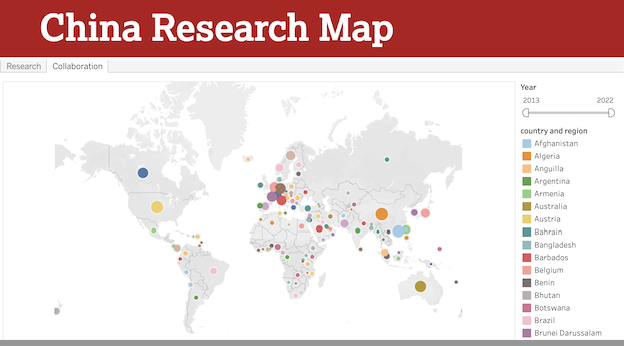LUCC News, February 2024

The February 2024 edition of LUCC's newsletter is out.
You can receive our newsletter via the mailing list - just send an email to china.centre@lancaster.ac.uk

LUCC News: February 2024

Happy Year of the Dragon 龙年大吉!
It's Spring Festival time, so a very happy Year of the Dragon from all at LUCC!
The program of events in 2024 is in full swing, with a full-house for Dr. Olivia Cheung's Jan 30 talk on her new book, The Political Thought of Xi Jinping, and Dr. Philippe Major (above) presenting his fascinating work on Liang Shuming and Xiong Shili’s Confucian Iconoclasm.
We’ve also had the privilege of hosting Prof. Howard Davies' reflections on 33 years between China and the West, and Prof. Ariane Ollier-Malaterre's deep ethnographic research on Chinese citizens' experiences of living with digital surveillance.
Today at 1.30pm in a joint session with the LU Confucius Institute, we have Prof Sarah Eaton discussing liberal international order and standard-setting. Then on March 5, Ant Hesketh of LUMS will outline his research agenda for a radical new concept of value. For all the details see the LUCC website's Events section.
Finally, this month we’re also excited to soft-launch the LUCC China Research Map, a unique tool visualising the whole university’s research about, and in collaboration with, China and the Global Sinosphere. Do take a look and let us know what you find useful (or not!), and what you'd like to see moving forward.

Read on for the latest from LUCC’s people, new research and public engagement.
People
LUCC is delighted to welcome Dr. Ou LIN (Law) as a new LUCC Fellow, and Dr. Nick Wong of Hong Kong University of Science and Technology as Non-Resident fellow.
Ou LIN
Dr. Ou LIN joined the Lancaster Law School as a Lecturer in Employment Law in September 2023. She is particularly interested in the regulation of platform work and other precarious employment relations. In addition to doctrinal analysis of the law, she embraces socio-legal methods to observe the interactions between law and the real world. Ou's doctoral thesis examines 'Workers' Spontaneous Struggles and Resistance in the Chinese On-Demand Economy'.
Nick WONG
LUCC would also like to welcome Dr. Nick Wong as the latest Non-Resident Fellow. An alumni of the LUCC Doctoral Fellow program, Dr. Wong is an applied linguist and Lecturer at Hong Kong University of Science and Technology (HKUST). His work has examined the non-standard writing practices used by Hongkongers within the theoretical framework of translanguaging, and he is also the founder of “Kongish Daily” and the notion of “Kongish”. Read more about Nick's latest activities in the Research and Engagement sections below.
Profiles of all LUCC’s fellows are available at our People page.
New Research
Military metaphors have been used intensively and excessively against the COVID-19 pandemic worldwide since its outbreak in 2020. In this article, we consider “war” and “military” analogies as keywords to approach the pandemic culture by examining the use of war metaphors at the time of COVID-19 and its relationship with selective “war” memories in the first year of the global outbreak of the pandemic. Specifically, we underpin the heterogeneity of such use of metaphors and their relationships with geopolitics, collective memory, and nationalism. We examine the contexts in which these war frames against COVID-19 were articulated and their affective and discursive implications to geopolitics outside of a Western-centric context through two case studies in East Asia – Hong Kong’s bottom-up military analogies in the post-Anti-ELAB era and Taiwan’s biopolitical nationalism against China. Our discussion underscores the significance of contexts in considering the purpose and impact of military metaphors against COVID-19, and also other diseases and even disasters of all kinds in the future, by highlighting the geopolitical trajectories outside of North America and Europe, where regional war memories and military tensions are referenced to inform localdefinitions of security, safety, and securitization practices.
Future Crises in the Indo-Pacific: The Shadow of Chinese Public Opinion - Andrew Chubb
From the Senkaku Islands to the South China Sea and the Sino-Indian border, the People’s Republic of China (PRC) has wielded Chinese public opinion as a diplomatic weapon in multiple recent regional crises. Although the Chinese Communist Party (CCP) has extensive capabilities for controlling public opinion, Beijing often emphasizes that its options for diplomatic compromise are limited by the specter of Chinese popular nationalism. Many foreign governments now routinely monitor Chinese online sentiments about their country, suggesting that Chinese public opinion is seen as in some way informative. But how is it interpreted, and what impact does it have in times of crisis? Do outbursts of nationalist anger help China convey military resolve, telegraph threats of economic punishment, or induce other nations to tread more carefully? Or do they backfire, provoking the target and steeling resolve to resist China’s demands or even confront China militarily? This report offers unique preliminary insight into these questions from a survey experiment conducted in Australia, New Zealand, Singapore, the Philippines, Malaysia, Vietnam, Taiwan, South Korea, Japan, Kazakhstan, and India in 2022, comparing respondents’ views of a crisis before and after Chinese public opinion becomes a salient factor in the scenario.
Internet Memes In China: Cultural Image Macros of Code-Switching and Homonymy - Aiqing Wang
Since China joined the Internet in the late 1980s, production and consumption of online cultural merchandise has been proliferating and permeating every section of society, exemplified by Internet literature, animation, comic and game. Meanwhile, there has emerged a veritable kaleidoscope of memes in China’s cyberspace, which are deployed on social media platforms to convey stances, emotions, humorousness, etc. Nonetheless, as a multi-faceted phenomenon, Internet memes fail to attain deserved academic scrutiny, so in this paper, I investigate one subcategory of memes in China’s cyberspace, viz. cultural memes, focusing on image macros that dynamically integrate visual effects and textual information. The text of cultural image macros can be generated via Chinese-English code-switching in the form of alphabetic words that are either idiomatic or related to Internet buzzwords. Alternatively, cultural image macros in China can be generated via homonymy: the vast majority of homonyms are homophones, while a small proportion of them are homographs. The corresponding images in the memes pertain to the inserted English words or constituents that are substituted, thereby complementing the text and strengthening humorous effects.
Indirect Emissions from Organophosphite Antioxidants Result in Significant Organophosphate Ester Contamination in China - Kevin Jones
Organophosphite antioxidants (OPAs) have been seriously neglected as potential sources of organophosphate esters (OPEs) in environments. This study utilizes a modeling approach to quantify for the first time national emissions and multimedia distributions of triphenyl phosphate (TPHP)─a well-known flame retardant─and three novel OPEs: tris(2,4-ditert-butylphenyl) phosphate (AO168═O), bis(2,4-ditert-butylphenyl) pentaerythritol diphosphate (AO626═O2), and trisnonylphenol phosphate (TNPP)... Both AO168═O and AO626═O2 exhibit high overall persistence ranging between 2 and 11 years. Source emissions and environmental concentrations are elevated in economically developed areas, while persistence is higher in northern areas, where precipitation and temperature are lower. This study shows the significance of the sources of OPA to OPE contamination, which supports chemical management of these substances.
Design Harvests: A Network of Social Collaborative Innovation Hubs - Serena Pollastri
The paper introduces an innovative social collaborative design project: “Design Harvests”— Design for Xian Qiao sustainable rural community in Chongming. The goal of this project is to create prototypes of sustainable rural-urban interaction and development based on the usage of local resources and strengths. One of the most important proposals is to establish a network of innovation hubs together with the local community. Each innovation hub will be a platform of promoting a series of sustainable design solutions for local development. Moreover, it will incubate and demonstrate new business models based on the resources of the rural communities and interaction between urban and rural. Meanwhile, a systematic network is designed and formed among the hubs to have holistic and systemic impacts throughout the whole territory. The key principle of this project is co-creation and interdiscipline. Enabling the local community through social collaboration is one of the main tasks of this project. Social collaboration in this project is not only the cooperation among different stakeholders such as government, enterprises,designers and communities but also among different disciplines such as economics,sociology,engineering and design. To conclude, the paper summarizes the methodology used in this project and explores more possibilities of how design can contribute to such a kind of social collaborative process.
Translator Studies on Sidney Shapiro: A Case Study of Registration - Aiqing Wang
As a leading figure of a distinctive literary school dubbed 山蛋派 Shanyaodan Pai ‘Potato School’, 理Zhao Shuli has composed a myriad of novellas and novels concerning peasantry, countryside and societal transformation. Three of Zhao’s fiction have been rendered into English by an illustrious translator Sidney Shapiro (aka 沙博理Sha Boli), viz. 小二黑结婚Xiaoerhei Jiehun ‘The Marriage of Young Blacky’, 孟祥英翻身Meng Xiangying Fanshen ‘Meng Xiangying Turns Over’ and 登记Dengji ‘Registration’. In this research, I investigate the English version of Registration, which has not attained deserved critical attention. I place an emphasis on translator studies, exploring the translator’s ideology, telos and stance. As a prolific translator with communist ideology, Shapiro has rendered a profusion of literary works pertaining to the Chinese Communist Party and the masses’ struggles in Anti-Japanese War of Resistance. In the target text of Registration, Shapiro manifests his aspirations to disseminate traditional and modern Chinese culture, in accordance with the party-state’s intention to enhance the country’s image upon the foundation of the People’s Republic of China in 1949.
Using Text Corpus to Improve Written English : Data Driven Learning - Noah Zhu
LUCC Doctoral Fellow Noah Zhu has a project in collaboration with the University of Queensland on EdX online education called 使用语料库提升英语写作:数据驱动学习 (Using Text Corpus to Improve Written English : Data Driven Learning). It is designed to help not only Chinese students whose study environment is English-speaking, but also teachers of academic English.
LUCC Fellow Zoe Zhu writes in the Journal of Organizational Ethnography, investigating the politics of smiling as a central driver for employees to navigate power dynamics within the prevailing discourse at a Japanese retailer in Hong Kong. Existing critical management studies emphasize power in organizational language, often neglecting the role of employees’ emotions in sustaining discourse. This paper examines employees’ smiles as tools for legitimizing (sensegiving) and interpreting (sensemaking) discourse. It explores how the use of their emotional display influenced the outcome of the company’s attempt to legitimize discourse. Data were collected through the author’s long-term participant observation in the Hong Kong branches of Japanese retailers. In practice, employee smiles serve as tools for negotiating power—shaping careers, earnings and shift preferences. Furthermore, this paper highlights the transnational impact of Japanese culture in Hong Kong, which has shaped the way Japanese top management and local employees interpret the dominant discourse.
Outreach & Engagement
LUCC Visiting Scholar Gulnara Zholzhanova has recently published two articles in leading Kazakh media on China (read via Google Translate):
- On US-China relations: https://egemen.kz/article/353452-aqsh-qkhr-qayta-dgandanghan-baylanys
- Kazakh-China economic ties: https://egemen.kz/article/351728-qazaqstan-qytay-ekonomikalyq-baylanys-negizderi
On December 7-9, Doctoral Fellow Qin Fan presented at the 18th Biennial Conference of the Chinese Studies Association of Australia (CSAA). The title of Qin's presentation was "Discourse, Distinction and the Construction of Middle-class Identity in China's High-end Sustainable Businesses".
On December 8, Dr Lingxuan Liu co-hosted an event organized by China Unicom, joined by Lancaster colleagues including David Tyfield and Niki Panteli. Details were reported by People's Daily.
Non-Resident Fellow Dr Nick Wong gave at talk at the Department of Chinese Language and Literature, Chinese University of Hong Kong on "The son of Cantonese: Studying Kongish, "the four-unlike", from the perspective of translanguaging (粵語之子:從超語言現象角度去看四不像的港語 Kongish) on 26 January 2024.
Prof Jinghan Zeng was on BBC 4 World Tonight, talking about ten years of the Belt and Road, and did a live interview with Asharq News on China's role in Israeli–Palestinian conflict, and Dr Andrew Chubb commented on Sino-Philippine maritime tensions for France24, and on 9DASHLINE regarding Australia-China ties.
Culture & Community
Call for Papers - Fourth Interdisciplinary Belt and Road Conference
On Thursday 13th June 2024 to Friday 14th June 2024, the Fourth Belt and Road Initiative Interdisciplinary Conference will take place at Lancaster University.
There is a call for papers related to the following research topics:
- International Relations and the BRI
- Intercultural communication and the BRI
- Digital Silk Road and high tech policy
- Governance, law and the BRI
- Health Humanity and the BRI
- Discourse studies and the BRI
Interested faculty members, researchers and postgraduate students are welcome to submit a paper. Abstract requirements:
- Abstracts should be between 150-200 words in English.
- Please include positions, affiliations, and email addresses for all authors with a short bio (max. 300 words).
- Please use Times New Roman 12-point font size, single spaced.
- Both published and unpublished works are accepted.
- The submission of full papers is strongly encouraged but not required. However, registrants who submit a full paper will have a better chance of being invited to present their paper in similar circumstances.
Please email your paper to BRI-2024@lancaster.ac.uk by 29 February 2024.
For more information about the Fourth Belt and Road Initiative Interdisciplinary Conference at Lancaster University, please visit the Lancaster University Confucius Institute website: Fourth Belt and Road Initiative Interdisciplinary Conference - Lancaster University
Ink on Silk Painting Workshop
Now open for registration. Participants of all drawing levels are welcome!
Workshop time will be flexible from 2nd January - 5th April.
In this friendly 2-hour workshop, you will explore and develop your understanding of Chinese ink painting, learn to paint with precious Chinese traditional handmade silk (transported from China), and have individual instruction on choosing either traditional or contemporary topics to paint with ink.
Each workshop will be a small group (1to 1 -1 to 4 people in each workshop). After attending the workshop, you will:
1. Get one piece of self-made painting on silk with fine mounted on paper board to take home.
2. Take part in a co-create artwork using ink to paint on the 30-meter silk roll, which will be exhibited in the Lancaster Biggest Gallery- the Storey Gallery at the end of April.
Registration link: https://forms.office.com/e/FmxS0rUy0t
For more information and to book contact LUCC Doctoral Fellow Zi Quan: z.quan@lancaster.ac.uk (Instagram: ziquan_art)
Back to News
